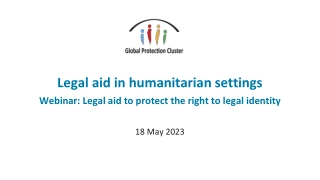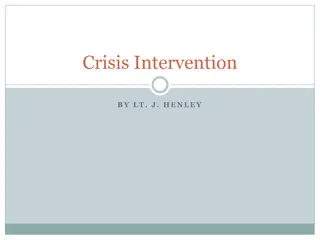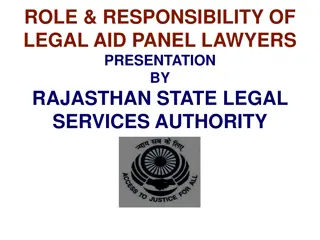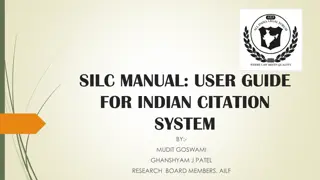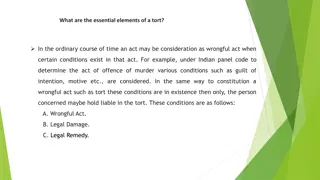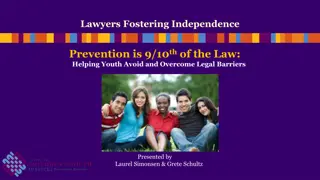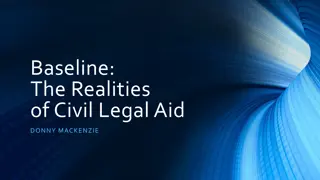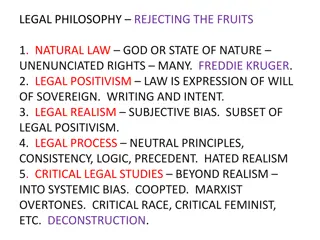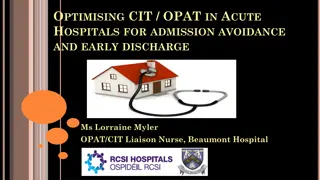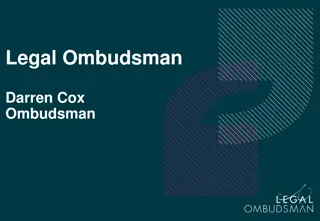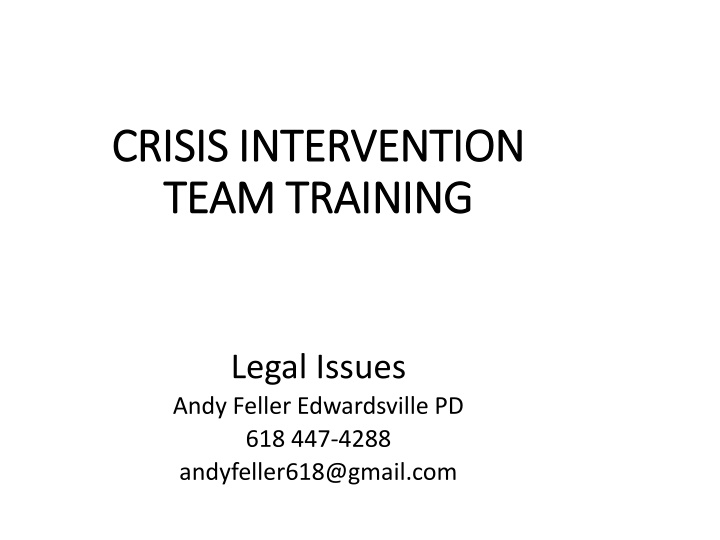
Mental Health Law and Crisis Intervention Procedures
Explore the essentials of the Mental Health and Developmental Disabilities Code, including criteria for involuntary admission, law enforcement procedures, and individual rights in mental health facilities. Gain insights into legal issues and confidentiality exceptions in transporting individuals to mental health facilities.
Download Presentation

Please find below an Image/Link to download the presentation.
The content on the website is provided AS IS for your information and personal use only. It may not be sold, licensed, or shared on other websites without obtaining consent from the author. If you encounter any issues during the download, it is possible that the publisher has removed the file from their server.
You are allowed to download the files provided on this website for personal or commercial use, subject to the condition that they are used lawfully. All files are the property of their respective owners.
The content on the website is provided AS IS for your information and personal use only. It may not be sold, licensed, or shared on other websites without obtaining consent from the author.
E N D
Presentation Transcript
CRISIS INTERVENTION CRISIS INTERVENTION TEAM TRAINING TEAM TRAINING Legal Issues Andy Feller Edwardsville PD 618 447-4288 andyfeller618@gmail.com
Objectives Define key definitions under the Mental Health and Developmental Disability Code Identify when law enforcement can take an adult into custody to transport to a Mental Health Facility
Objectives Identify when law enforcement can take a minor into custody to transport to a Mental Health Facility Explain the exceptions provided by the Confidentiality Act
Mental Health Law The rights of the individual Because liberty rights of an individual are involved, the courts have held that there must be a strict compliance with the mental health code when a person is to be placed in a facility against his/her will for treatment
The Mental Health and Developmental Disabilities Code 405 ILCS 5/ Is the exclusive means by which a person is hospitalized Regulates how a person is detained, transported, admitted, transferred, and discharged from a hospital
The Mental Health Code 405 ILCS 5/ Person subject to involuntary admission a person with mental illness who: because of his or her illness is reasonably expected, unless treated on an inpatient basis, to engage in conduct placing such person or another in physical harm or in reasonable expectation of being physically harmed
The Mental Health and Developmental Disabilities Code 405 ILCS 5/ Person subject to involuntary admission a person with mental illness who: because of his or her illness is unable to provide for his or her basic physical needs so as to guard himself or herself from serious harm without the assistance of family or others, unless treated on an inpatient basis
The Mental Health and Developmental Disabilities Code Person subject to involuntary admission a person with mental illness who: refuses treatment or is not adhering adequately to prescribed treatment; because of the nature of his or her illness is unable to understand his or her need for treatment; and if not treated on an inpatient basis, is reasonably expected based on his or her behavioral history, to suffer mental or emotional deterioration and is reasonably expected, after such deterioration, to meet the criteria of either paragraph one or paragraph two above
Law Enforcement Scenarios Family, friends, or citizens contact police for assistance during a crisis Threatened by unusual behavior Street encounter with a person with a mental illness Court Order Physician certification to detain/transport Victim/perpetrator of a crime Suicidal subject
Voluntary Admissions Voluntary admission 16 years or older may request for self No court proceedings Signs in freely and able to give informed consent for treatment 5-day notice required to discharge
The Mental Health and Developmental Disabilities Code 405 ILCS 5/1-129 Mental Illness. "Mental illness" means a mental, or emotional disorder that substantially impairs a person's thought, perception of reality, emotional process, judgment, behavior, or ability to cope with the ordinary demands of life, but does not include a developmental disability, dementia or Alzheimer's disease absent psychosis, a substance abuse disorder, or an abnormality manifested only by repeated criminal or otherwise antisocial conduct
The Mental Health and Developmental Disabilities Code 405 ILCS 5/1-114 Mental Health Facility. "Mental health facility" means any licensed private hospital, institution, or facility or section thereof, and any facility, or section thereof, operated by the State or a political subdivision thereof for the treatment of persons with mental illness Does NOT include emergency rooms
The Mental Health and Developmental Disabilities Code 405 ILCS 5/1- Developmental Disability. Developmental Disability means a disability (with onset prior to 18 years old) that is attributable to : Intellectual Disability Cerebral Palsy Epilepsy Autism Spectrum Disorder
Petition for Involuntary Admission MUST be 18 years old to petition another Requires a detailed statement of the reason that the respondent is subject to involuntary admission to include: Signs and symptoms of MI Description of any acts, threats, behaviors, or patterns of behavior Place and time of occurrence Behaviors must have occurred within last 72 hours
Harm to self or someone else Harm to self of someone else
Harm to self or someone else Harm to self or someone else Unable to care for self Unable to care for yourself
Refuse treatment but because of history, will meet 1st or 2nd
Done to provide aftercare upon release Done to provide aftercare upon release
NOTE: Supervisors may not be able to leave venue but can still complete a petition and have an officer deliver the person to the hospital X X
Used if you have a witness to interview or for the purpose of arrest
Petition for Involuntary Admission Process for Involuntary Admission Complete the petition Examination at hospital to determine status Completion of 1st certificate by qualified examiner Completion of 2nd certificate by psychiatrist Consumer receives admission documents All documents filed with the court Court proceedings required, subpoenas if necessary
When may law enforcement take an adult into custody and transport to the hospital? When a court order commands When an officer encounters a person with MI who, in his/her opinion, meets the requirements for involuntary admission LE officer is returning an involuntary patient to a facility following an elopement
When may law enforcement take an adult into custody and transport to the hospital? LE recognizes of signs of MI and (has probable cause) that person meets criteria for involuntary Determines that immediate hospitalization is needed to prevent harm from occurring The officer shall complete a petition The transporting officer does NOT have to be the petitioner
When may law enforcement take a minor into custody and transport to the hospital? Who is allowed to admit a minor? Parent and guardian Loco Parentis Any interested person who is at least 18 years old if no one else can be located Application by an adult for a minor (Kiddie Petition)
Standard for Involuntary Admission of a Minor Under 17 Minor has a MI or emotional disturbance of such severity that: Hospitalization is medically necessary, and Minor has the capacity to benefit from treatment Physician, psychologist or clinical social worker states in writing that he/she has personally examined the minor, and Minor meets standard for admission
Mental Health and Developmental Confidentialities Act 740 ILCS 110/12(d) The Confidentiality Act imposes the duty to safeguard the privacy of people who have a mental illness and/or developmental disabilities Includes information that identifies that the person is a recipient of services Mental Health professionals may disclose, usually to law enforcement If there is a clear, imminent risk of serious physical or mental injury
Mental Health and Developmental Confidentialities Act 740 ILCS 110/12(d) Law Enforcement may obtain disclosure in certain circumstances without first retaining a release When a consumer elopes from a facility When a missing person report is made, authorized to receive whether or not the missing person is/was a patient
Mental Health and Developmental Confidentialities Act 740 ILCS 110/12(d) Continued: During the investigation of a forcible felony can receive information on: Any person found unfit to stand trial, or not guilty by reason of insanity who may have been away from the facility at the time the offense was committed And Whose description reasonably matches the offender, or whose past behavior matches that of the offender
Confidentiality of Students FERPA (Family Educational Rights and Privacy Act) Mandates confidentiality of student information (Exceptions) To comply with a judicial order or lawfully issued subpoena Appropriate officials in cases of health and safety emergencies
Immunity and Indemnification No officer shall be personally liable and no cause of action may be brought for damages resulting from the exercise of judgment or discretion in connection with the performance of Program duties or responsibilities, unless the act or omission involved willful or wanton conduct
FOID Revocation 430 ILCS 65/1 Convicted of poss. of Cannabis or Controlled Sub. Determined to be addicted to narcotics (not prescriptions) Adjudicated: Mentally ill, Condition or Disease Clear and Present Danger (self/others) Unable to manage own affairs Subject to involuntary/judicial admission NOTE: Numerous other conditions apply for revocation
Revocation of FOID Letter sent to FOID card holder notifying them of the revocation FOID card surrendered to local LE agency within 48 hours Revoked person must complete Firearms Disposition Record LE required to forward FOID card and Firearms Disposition Record to ISP If revoked person is also a sponsor of a minor, then the minor s card must also be surrendered
50 ILCS 725/7.2 Possession of a FOID Card. An employer of an officer shall not make possession of a FOID Card a condition of continued employment if the officer's FOID Card is revoked or seized because the officer has been a patient of a mental health facility and the officer has not been determined to pose a clear and present danger to himself, herself, or others as determined by a physician, clinical psychologist, or qualified examiner. (Nothing is this Section shall otherwise impair an employer's ability to determine an officer's fitness for duty).
Clear and present danger means a person who: 1. Communicates a serious threat of physical violence against a reasonably identifiable victim or poses a clear and imminent risk of serious physical injury to himself, herself, or another person as determined by a physician, clinical psychologist, or qualified examiner; or 2. Demonstrates threatening physical or verbal behavior, such as violent, suicidal, or assaultive threats, actions, or other behavior, as determined by a physician, clinical psychologist, or qualified examiner, school administrator, or law enforcement official.
Conceal/Carry 430 ILCS 66 Within 30 days of submitting an application, Any law enforcement agency may submit an objection to a license applicant based upon a reasonable suspicion that the applicant is a danger to himself or herself or others, or a threat to public safety. The objection shall be made by the chief law enforcement officer of the law enforcement agency, or his or her designee, and must include any information relevant to the objection
Conceal/Carry 430 ILCS 65/8.1 Illinois State Law (430 ILCS 65/8.1) now requires Law Enforcement Officials and other persons to make timely notification to the Illinois State Police (ISP) when there is a determination that a person poses a Clear and Present Danger . This reporting process is intended to prevent individuals determined to pose a clear and present danger from having access to firearms or firearm ammunition by denying or revoking the individual s FOID Card.
The statute requires that, If a person is determined to pose a clear and present danger to himself, herself, or to others: By a law enforcement official or school administrator, then the law enforcement official or school administrator shall, within 24 hours of making the determination, notify the Department of State Police that the person poses a clear and present danger. The Department of State Police shall adopt rules to implement this section.

